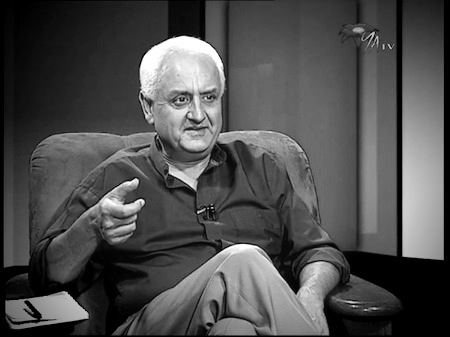
Kanak Mani Dixit is editor of Himal Southasian regional magazine and publisher of the Nepali-language Himal Khabarpatrika newsmagazine. He was actively involved in resisting King Gyanendra’s takeover and was detained many times by the Police. Kanak’s career spans the United Nations as well as media, and he is also an author of a number of children’s books. Though extremely humble, Kanak is one of South Asia’s best known journalists. He is also the Chair of the Film South Asia documentary film festival, among the best known film festivals in South Asia.
I first met Kanak around seven or eight years ago in Kathmandu, at a time when media from Sri Lanka and media from Nepal had several exchange programmes. Kanak stood out as one of the most progressive voices in the country, and in later years, one its most fearless, participating in the peoples movement against a monarchy that violently clamped down on dissent. Writing in 2006 Kanak averred,
Thanks to the people’s rebellion, Nepal might just do all south Asia proud. The reader will pardon my presumption, and good cheer, as I write this from inside, looking out at a transforming nation.
Nepal in 2010 is a very different country on many levels. Democracy has not brought with it the expected systemic change, and frustrations abound. This was the background to our conversation, which I began by asking Kanak how he got into journalism from his training first as a lawyer.
Kanak repeatedly makes the point – unless one communicates in the vernacular, one cannot inform public opinion or participate in popular debates. English he says is important, but not enough. In fact, Kanak goes to the extent to say that it is only after he was able to write in Nepali that he felt he he could call himself a journalist. I used this to explore issues of language, media and politics in Nepal and South Asia. We then venture into the politics and perception of identity, both as national as well as regional.
Kanak goes on to question why, even with the access to and adoption of new media and other media technologies, there is seemingly no reciprocal increase in the quality or quantity of documentary filmmaking that critiques vital socio-political and economic issues. Instead of civil society, Kanak sees the most frequent use of new media by demagogues. On this score, we talk about Kanak’s pro-democracy activism, and compare it with similar struggles in the region, including in Sri Lanka. Kanak’s coinage of the phrase ‘a peoples tsunami’ is one he recalls to describe the height of the pro-democracy struggles in his country. The autocratic king and violent politics that Kanak and hundreds of thousands of others rose up against is sadly, deeply resonant in Sri Lanka today.
In standing up for principled politics and democracy, I ask Kanak how media can and did play a role, and what, if any safeguards there are against the inevitable verbal and physical violence. Believing in the essentially democratic nature of peoples, Kanak’s final thoughts are on bridging language divides in society and media by engendering an internationalist perspective in the vernacular media.